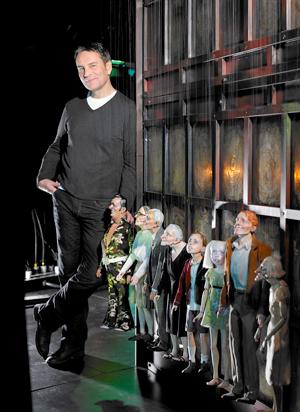After pulling strings for 25 years, puppeteer Ronnie Burkett and his Theatre of Marionettes returns to Vancouver with his newest creation, Penny Plain. It’s also a return to the roots of his art for Burkett, who found himself veering slightly off course with his previous show.
With earlier shows focused on such weighty subjects as AIDS, the Canadian blood crisis, and censorship, in 2008 Burkett experimented with Billy Twinkle: Requiem for a Golden Boy, a semi-autobiographical piece in which he plays the title role alongside his marionettes.
Even before the critically acclaimed Billy Twinkle had completed its tour last Halloween, he was hard at work on Penny Plain and eager to get back to more familiar territory.
With a laugh, Burkett blames David Suzuki and the pseudo-documentary television series Life After People for his new apocalyptic dark comedy.
“It started me to think about the complete arrogance we have about the end of the world. We think that when that time comes it is the end of everything, but in reality it is just the end of us humans. The planet itself will survive.”
If his earlier works explored more overtly political subjects (not without a little outrage), and Billy Twinkle was more personal, Burkett sees Penny Plain as the bridge between.
“I think I am straddling both right now,” he says. “You can’t actually be an out gay person without being political, especially with it being such a wacky time politically.”
“And while the politics are deeply important to me, I also don’t want to turn into one of those granola-bar types that are just boring,” he adds. “I remind myself that I am also part of a service industry and entertainment.”
In staging Billy Twinkle, Burkett found himself in what he called his “invisibility period” — caught somewhere between being young and groovy and being charming and elderly. It was perhaps not surprising that he chose to play a character himself, rather than simply pull the strings.
Then he had a revelation: how odd was it for such a shy person to throw himself in front of several hundred people each night? Now he feels very comfortable in his own skin. “It was very freeing to be invisible, and it did allow me to become brave again.”
With this newfound bravery comes the realization that at 54, he can give up some of the spotlight to his creations, knowing that what’s going on personally matters as much as maintaining a hold on his youthful and more political past.
“In my 20s and 30s, I wasn’t quite prepared to give up the focus to the puppets. But now I’m quite content to be up above and let people disappear into those little moments onstage. I used to be very flashy, but now there are the quiet moments, those discussions that are a little hard. But I’m still essentially that goofy 14-year-old that got to keep doing it.”
In Penny Plain that goofy 14-year-old resurfaces in Burkett’s ability to make us laugh as the world crumbles around his characters.
But the more introspective Burkett makes no secret of his desire to connect with his audience through his marionettes. Though he says it doesn’t work every night, when it does, it is magical.
“My job has always been to be this big, cheeky, gay way to shrink the world and hold a mirror up to it. By making our species into these things, it becomes a safe way to look at the world. Because they are not real, an audience can layer their own fears and references on these small tiny things. That is what keeps me addicted to strangers in the night.”

 Why you can trust Xtra
Why you can trust Xtra


